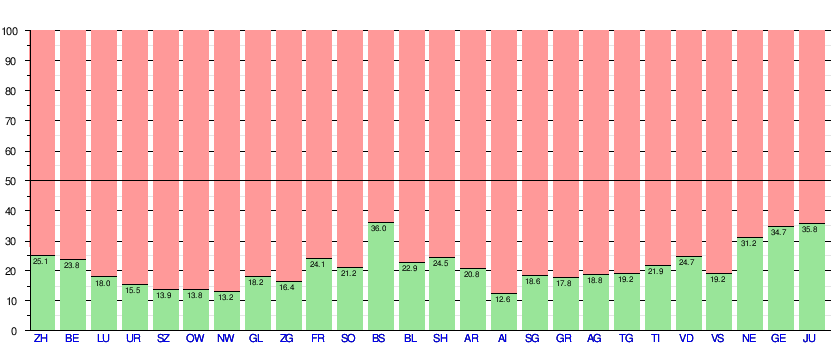Basic Income Earth Network - Switzerland
UBI vote: one person in four says “yes”
The initiative for an unconditional basic income obtained 23% “yes” votes in Switzerland as a whole, 19.5% in German Switzerland, 28.3% in French Switzerland and 21.9% in Italian Switzerland. This is a very respectable result for something that just a short time ago was completely unknown, was backed by practically no political forces, and was proposing a fundamental paradigm shift.

Large cities returned quite impressive “yes” scores. A number of places even achieved majorities for UBI, such as four central districts in Geneva (Pâquis 54.6%, Mail-Jonction 52.9%, Cluse-Roseraie 51.1% and Prairie-Délices 50.8%), two in Zurich (districts 4 et 5, 54.7%) and the village of Sarzens in Vaud (51.4%).
A large majority of those over 65 voted “no” (84%), while the age bracket with the highest “yes” score (29%) was that of those between 35 and 49. Cities were more in favour, with 31%, than suburbs where the score was 20% or the countryside with 21%. An interesting difference is that between the scores of those in full-time employment or retirement, with 22% and 16% respectively, and that of those out of work, 45% of whom approved the introduction of a UBI. Househusbands and housewives also scored fairly high, with 29%.
UBI generated an enormous amount of excitement in the three months leading up to the vote. The media gave it pride of place and the social networks were buzzing, with UBI putting the many other subjects being voted on in the shade. Political observers were unanimous in their praise of a highly creative campaign for a “yes” which organized first-rate media happenings, such as giving away 10-franc notes and establishing a new world record in Geneva for the largest poster ever. It was generally admitted that on the internet supporters of the initiative scored a decisive victory, offering interactive web sites, being omnipresent on social networks and producing excellent videos to inform and entertain.
Given how little political support it received (none, in fact, except for the Green Party at the end of the campaign) and its lack of money, the fact that almost one person in four is already in favour of our plan for society today shows that sooner or later a majority of the Swiss will approve it. In fact, in an exit poll from Swiss radio and television even those who had voted “no” expressed a desire for the discussion on a UBI to continue and for trials to be carried out.
The Swiss UBI movement has grown tremendously in the last three months and will continue to do so. The campaign will carry on, with new goals including analyzing the questions and doubts which arose before the vote, making new proposals for how to implement a UBI, political lobbying for cooperation and to acquire support, and promoting further trials of UBI such as that planned for Lausanne.
In any event, a seed has now been planted in the minds of the Swiss. Coming social upheavals, and the growing threats to our social systems which all depend on a high level of employment, will all contribute to this seed growing and ripening.
- Print node
 Email this !page
Email this !page- Login to post comments
- 13745 reads




Comments